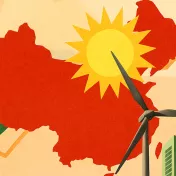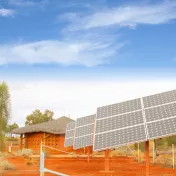In a new publication "Africa Renewable Energy Initiative For Africa: African Civil Society Organizations Perspective" (see download link below), the African Coalition for Sustainable Energy and Access (ACSEA) presents African CSOs viewpoints and demands with regard to AREI and surrounding activities.
The African continent and its population suffer from severe energy poverty. The International Energy Agency estimates that the total grid-based power generation capacity in 2012 was only about 158 gigawatt (GW), which is less than total installed capacity in Germany alone. Consequently, the majority of the African population – approximately 622 million out of 922 million people living on the continent – still lacks access to modern energy services. Although the African continent has abundant renewable energy (RE) resources, the potential for the generation of renewable electricity has not been realized yet. Hence, besides the traditional use of solid biomass, the African electricity mix is still dominated by fossil fuels, such as oil, coal, and gas, as well as large hydro power plants. In light of the increasing electricity demand and, at the same time, the need to choose a low-carbon development pathway, electricity generation based on REs could achieve a multiple-win situation on and for the African continent with respect to the twin challenges of climate change and sustainable development.
The Africa Renewable Energy Initiative – People-centered development based on renewables
The Africa Renewable Energy Initiative (AREI) aims towards the installation of 10 GW of new and additional RE generation capacity by 2020 and at least 300 GW by 2030. This ambitious effort could pave the way for a low-carbon development pathway for all African countries and, therefore, represent a landmark initiative to tackle dangerous anthropogenic climate change, in line with the ambitious objectives set by the Paris Agreement. In addition, the initiative is embedded in the context of sustainable development meaning that – in line with Sustainable Development Goal (SDG) 7 – energy access is understood as a precondition for enhanced human well-being and economic development as a whole. Additionally, the initiative represents a continent-wide effort to combat anthropogenic climate change congruent with SDG 13. While numerous initiatives exist that aim towards an advancement of electricity based on renewable energy sources and/or energy access on the African continent, a special and distinguishing feature of AREI is that it is Africa-owned and Africa-led, strongly anchored in African political and decision-making processes: The initiative was developed under the mandate of the African Union (AU) and endorsed by the Committee of the African Heads of State and Government on Climate Change (CAHOSCC).
Shaping AREI – Chances for civil society engagement
AREI was officially launched at the Paris climate change conference (COP21) in December 2015. The young initiative is currently in transition from its immediate establishment phase to action phase I (2017 to 2020), during which concrete enabling activities as well project implementation will take place aiming at 10 GW of new and additional RE generation capacity. So far, an interim Independent Delivery Unit (IDU) hosted at the African Development Bank has been established and different high-level AREI stakeholder events have taken place. Furthermore, the initiative outlined its evaluation methodology (criteria and procedures) for projects and programs, initiated its mapping work for existing RE initiatives and developed a first preliminary assessment of RE-based projects for its project pipeline. Multi-stakeholder participation and engagement is meant to be a key feature of the initiative, which should – according to the AREI progress report – be significantly scaled up during 2017. The initiative's founding documents explicitly mention the intention to build on the experience of civil society, both African and international, in order to accomplish two objectives: a) mobilize support, build public pressure; and b) spread awareness and design, conceptualize, and inform policies and programs on the ground.
Results from an online survey
In a new publication "Africa Renewable Energy Initiative For Africa: African Civil Society Organizations Perspective", the African Coalition for Sustainable Energy and Access (ASCEA) presents African Civil Society Organisations’ (CSOs) viewpoints and demands with regard to AREI and surrounding activities. The survey was developed by the Pan African Climate Justice Alliance (PACJA) and the African Coalition for Sustainable Energy and Access (ACSEA) in cooperation with Climate Action Network (CAN), Réseau Climat & Développement (RC&D), Bread for the World, and Germanwatch. The survey was designed as a web-based survey and was online from the beginning of October 2016 to the end of December 2016. The survey collected views from African civil society representatives as to which issues they considered most important in the implementation of AREI. The survey was developed based on discussions, workshops, and interviews between African and international CSOs, but also on official documents (e.g., the AREI framework, the AREI action plan and criteria, the progress report presented by COP 21 president Ségolène Royal, etc.). The publication summarizes the survey findings and provides recommendations for a way forward for the initiative, based on civil society demands.
Civil Society participation more important than ever
Engaging civil society in AREI procedures has become even more relevant after, in March 2017, 19 projects have been approved by the AREI Board bypassing the AREI’s transparent procedures. These projects were not reviewed according to the AREI criteria and there are thus major concerns regarding the projects sustainability, additionality and even renewable nature. It is thus critical now to provide full accountability, transparency and participation for African civil society in all aspects of AREI. Active participation by all civil society constituencies must be ensured at all levels of AREI including its governing bodies, its workplan and project development, and project implementation on the ground.
This blog article has been written by Dr. Joachim Fünfgelt (Bread for the World), Jens Klawitter and Lutz Weischer (both Germanwatch).





